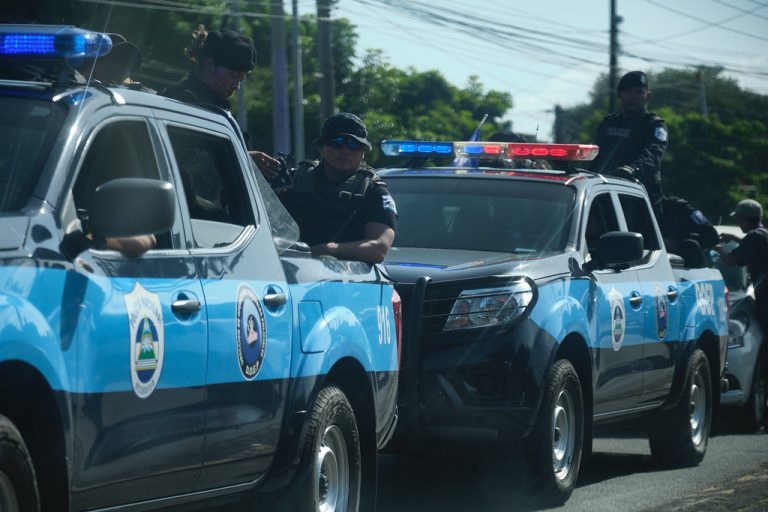13 de mayo 2023

Children of Exile: The Births “Sowing Hope” in the Camp of Nicaraguan Farmers

PUBLICIDAD 1M
PUBLICIDAD 4D
PUBLICIDAD 5D
Police take photos and threaten jail for Nicaraguans on a list of citizens targeted by Sandinista militants for posting messages against the regime.

Photo: Archive | Confidencial
The Nicaraguan Police are threatening to arrest people who criticize the Ortega-Murillo government on social networks or allude to the anti-government demonstrations that broke out five years ago. The denunciation was made public on May 11, by several Nicaraguans who had received such threats.
Those receiving such warnings included journalists, other professionals, and activists. According to their statements, law enforcement officers came to their homes to warn them not to continue posting criticisms of ruler Daniel Ortega and his wife and first lady Rosario Murillo on their social networks. They were likewise told to refrain from criticizing the children of the presidential couple, the Government, or making any references to the crisis that Nicaragua has been experiencing since April 2018.
“Five policemen came to my home looking for me, to tell me not to post things on my networks. They warned me that the next time I do so, they’ll send me to the Public Prosecutors’ Office,” to be charged with “treason against the homeland,” a Nicaraguan journalist told the EFE news agency.
Similarly, an agronomist told EFE that the police came to his home after he used his social media sites to demand that the government guarantee potable water in his city during the current dry season, when temperatures there have at times reached 104⁰ Fahrenheit (40 C).
“They came to my house and even took pictures of me,” the victim stated. From that moment on, like the journalist, he ceased posting criticisms on social media, for fear of being arrested and accused.
Yet another young professional denounced being visited by police in his home. In this case, they explained that his name appeared on a list drawn up by Sandinista party (FSLN) militants, who follow up on the social media feeds of government opponents and critics in each of the 153 municipalities of Nicaragua.
They told him he couldn’t continue posting anything against Ortega, nor react with amusement to posts about projects the government is carrying out or planning. They also told him not to mark with a “love” or a “like” any posts from exiled members of the opposition, nor recall the protests of five years ago, which left hundreds of deaths. Ortega continues to term these protests an attempted “coup d’état.” Although the professional obeyed every stipulation of the order, the Police issued him a citation to appear, just to demonstrate they weren’t just playing around.
These events played out one day after authorities executed a large round-up of dissenters in Nicaragua.
Last Wednesday, May 3, during the evening, at least 57 Nicaraguans, most of them opponents and critics of the Ortega government, were arrested and accused of “treason to the homeland.”
The prosecutors issued formal accusations to some 30 of the 57, in secret sessions held in Managua that same evening. The evident objective was to mount a scenario of fear, where the victims were confronted with armed police sticking their noses into the homes of the accused, followed by prosecutors, public defenders, and docile judges who do the regime’s bidding.
Those rounded up were returned home in the morning of May 4, after their court cases were opened in Managua. They were ordered to present themselves daily, from then on, to the police authorities in their respective departments.
Five human rights organizations, including Raza e Igualdad [Race and Equality], condemned this “new wave of abductions” and threats that took place in 13 of Nicaragua’s 15 departments and two Autonomous Caribbean Regions, according to the group Monitoreo Azul y Blanco [Blue and White Monitoring].
Nicaragua has been experiencing a political and social crisis since April 2018. The crisis escalated during the run-up to Nicaragua’s controversial general elections of November 7, 2021. Those elections were marked by Ortega’s imprisonment of his seven possible contenders several months before the vote, followed by his “reelection” – essentially without competition – for a fifth term, second together with his wife, Rosario Murillo as Vice President. The seven presidential hopefuls from that period are now in exile, declared stateless, and banished from returning after remaining in jail until February 9, 2023.
This article was originally published in Spanish in Confidencial and translated by Havana Times
PUBLICIDAD 3M
Agencia de noticias internacional con sede en Madrid, España. Fundada en Burgos durante la guerra civil española en enero de 1939.
PUBLICIDAD 3D